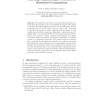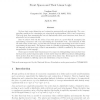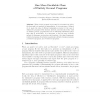120 search results - page 20 / 24 » Disjunctive Logic Programming and Autoepistemic Logic |
CMOT
1998
13 years 6 months ago
1998
A programming language which is optimized for modelling multi-agent interaction within articulated social structures such as organizations is described with several examples of it...
AAAI
2007
13 years 9 months ago
2007
Generality or refinement relations between different theories have important applications to generalization in inductive logic programming, refinement of ontologies, and coordin...
WDAG
2007
Springer
14 years 1 months ago
2007
Springer
Abstract. We examine the problem of detecting nested temporal predicates given the execution trace of a distributed program. We present a technique that allows efficient detection ...
AMAST
1991
Springer
13 years 10 months ago
1991
Springer
Boolean logic treats disjunction and conjunction symmetrically and algebraically. The corresponding operations for computation are respectively nondeterminism (choice) and concurr...
ICLP
2009
Springer
14 years 7 months ago
2009
Springer
When a logic program is processed by an answer set solver, the first task is to generate its instantiation. In a recent paper, Calimeri et el. made the idea of efficient instantiat...



